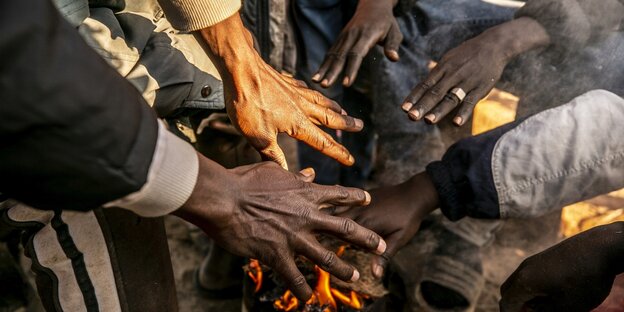More than 16,000 migrants have been camped near the port city of Sfax for months. At least 13 people drowned in a desperate attempt to escape.

Sfax, Tunisia, January 31: Refugees warm themselves by a campfire in a makeshift camp Photo: Yassine Gaidi/AA/Picture Alliance
SFAX taz | At least 13 Sudanese refugees drowned in a boat accident off the Tunisian port city of Sfax on Thursday. According to eyewitnesses, at least 27 occupants of a 10-meter-long metal boat are still missing. During the rescue operation, the Tunisian coast guard was able to rescue two survivors who were being treated for hypothermia in a hospital.
Due to strong winds and falling temperatures on the Tunisian coast, the largest fishing boats currently remain in ports. Therefore, local authorities consider the chances of survival of the missing people to be very low despite the ongoing search.
The accident highlights the humanitarian crisis around Sfax, which has been somewhat forgotten due to the war in Gaza. Since autumn, at least 16,000 migrants and refugees from sub-Saharan Africa have been waiting, some outdoors, along the coastal strip between the city of 330,000 inhabitants and the fishing village of Al Amra. The hygienic conditions in the area, reminiscent of an open refugee camp, are catastrophic.
Tensions continue to arise between the Tunisian population, the police and migrants, separated by nationality. In the fall, a National Guard officer was seriously injured when hundreds of Sudanese demonstrated against what they saw as arbitrary detentions and deportations to the deserts of Libya and Algeria.
Even in Tunisia little is known about the spiraling situation and the boat accidents that are reported almost weekly. International and local journalists were repeatedly banned from traveling to Al Amra or speaking to migrants. Several requests from European diplomats and parliamentarians to visit the site were rejected.
No aid organization in action
Security forces have set up a circle of checkpoints around people living along the miles of olive groves during the day. Now that the olive harvest is almost over and the weather is calming, an imminent escalation of the situation seems inevitable. Until now, many of those left stranded have been able to at least pay for food and a place in completely overcrowded accommodation by working as day laborers in seemingly endless fields.
“Like politicians in Europe, the Tunisian government perhaps hoped the problem would disappear into thin air.”
Aid organizations are not deployed in the area, only a few pregnant women, and medical emergencies were apparently attended to by mobile teams from the Organization for Migration (IOM), Taz learned during a visit to the site.
Human rights organizations and residents of the region's fishing villages are wondering what strategy President Kais Saied and the government will follow. “Like politicians in Europe, they could have hoped that the problem would disappear into thin air,” says Sfax-based activist Wahid Dahech. With his citizen initiative to restore democratic conditions and the rule of law in Sfax, the Tunisian unintentionally unleashed violence against immigrants.
Expelled from cities
After youth gangs incited numerous residents of Sfax against “the Africans” on social media, the National Guard and the police also participated in the “cleansing” of the commercial metropolis. Immigrants and refugees were expelled from the apartments they rented and from public parks, where many Sudanese war refugees in particular had found refuge.
Since there is no right to asylum in Tunisia, holders of UNHCR refugee cards from civil war zones also remain in the country illegally. Furthermore, the United Nations organization responsible for refugees only releases documents after a cumbersome procedure and in isolated cases.
“The result of this failure on multiple levels is that everyone between Al Amra and Sfax now hopes to cross into Europe in the spring,” says Wahid Dahech. “If the authorities continue to prevent ships from leaving, as agreed with Italy, living conditions here must improve.”
Incidents of violence are increasing, especially between Sudanese arriving daily through Libya and Algeria, mostly young people traveling alone, and Tunisian smugglers. Crossings are often already paid for, but then repeatedly canceled by smugglers.
The Sudanese refugees living in the village of Hmaydiya quickly seize the boats and leave. According to the immigrants, this also happened last Thursday. Despite the adverse weather conditions in the Mediterranean, the Sudanese crossed the sea from a beach near the town of Jebiniana, desperate over the conditions.